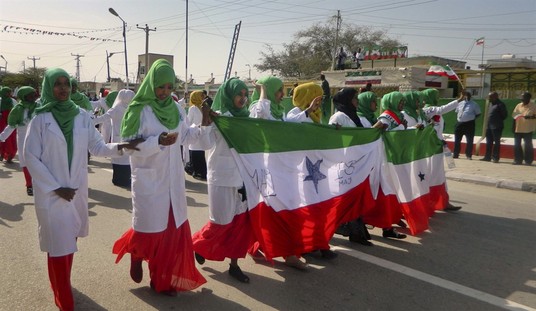The anti-Western policies recently adopted by Egypt’s military government may be spawning a surprising anti-Egyptian backlash in Washington. A movement inside and outside of Congress is calling for re-examination of the $1.3 billion in military assistance the U.S. gives each year to the Egyptian generals.
A call for an end to military aid reverberated throughout Washington last February, when President Hosni Mubarak refused to step down during the height of the “Arab Spring.”
Now, some see Egypt falling into an Arab Winter. Two observers recently noted that all is not well in land of the Nile, writing: “Post-Mubarak Egypt has morphed into a dictatorless tyranny.” Others believe the continuing flow of money is “simply rewarding bad behavior,” as Egypt is now expressing warmth toward Iran, Hamas, and the Muslim Brotherhood — while spurning Washington.
Since 1979, when former President Jimmy Carter helped to broker a peace agreement between Egypt and Israel, the United States has endowed the Egyptian military elite with a record $27 billion in military assistance — the second largest sum in the world. This largess has been said to have created an “economy within an economy.” And as a result, the Egyptian military is rife with corruption.
Egypt’s military/industrial complex is a topic rarely discussed in the West. Via U.S. aid, Egypt today operates a vast array of state-owned enterprises under the control of a military-run organization called the Armament Authority. This entity has enriched an entire generation of middle- to upper-level Egyptian officers.
The Armament Authority supervises the Arab Organization for Industrialization (AOI), an Egyptian-based Arab military organization established in 1975. The AOI supervises nine military factory complexes, which produce civilian goods as well as military products. They independently run a wide array of for-profit companies ranging from manufacturing cars and jeeps and running auto dealerships to managing hospitals.
The Egyptian web of armament factories is the largest military manufacturing complex in the Middle East, its military industrial base dwarfing all other Middle East countries including Saudi Arabia.
Egypt appears now to be run by a civilian prime minister, Essam Abdel-Aziz Sharaf, who once served as Mubarak’s transportation minister. On March 4 — the day he assumed power — Sharaf appeared on stage with Mohamed Beltagy, a Muslim Brotherhood leader. Sharaf is well-known to hold a strong stance against normalization of relations with Israel.
The balance of power, however, is held by a group of generals who comprise the Supreme Council of the Armed Forces. The generals are considered the real power behind the government. The group is secretive and opaque: last month Washington Post associate editor Lally Weymouth interviewed two of the council members — they only agreed to the interview on the grounds that they were not identified.
Lt. General Sami Hafez Enan, the Soviet-trained army chief of staff, is considered the general with the most influence in running Egypt’s affairs. Enan is also reported to be the Muslim Brotherhood’s “favorite general.”
Last month in Bali, Iranian Foreign Minister Ali Akbar Salehi met with his Egyptian counterpart, Nabil al-Arabi. Both said diplomatic and trade relations should improve now that Mubarak is gone. Tehran had severed ties with Cairo after Egypt signed its peace treaty with Israel.
The most devastating Egyptian military action since Mubarak’s demise has been the generals’ decision to open up its Rafah Gaza border. This allows Hamas unfettered shipment of weaponry through the border crossing. There are reports more than 400 al-Qaeda terrorists are now operating in Egypt’s Sinai.
The Egyptian military also has taken the initiative to broker a new “unity government” between between Palestinian factions Hamas and the Palestinian Authority. Egypt ignored U.S. and European Union requirements that Hamas first renounce violence, agree to abide by past agreements, and recognize Israel’s right to exist.
The Egyptian military, furthermore, continues to eye Israel as its prime enemy. Documents revealed by Wikileaks show that the Egyptian military continues to see Israel, not Iran, as its primary military threat despite a decades-old peace treaty. The Egyptian military has refused to change its Soviet-era preoccupation with major armor units poised to fight Israel, and the Wikileaks documents also show that American diplomats believe the generals do not appear interested in taking on the war on terror.
Since Mubarak’s departure, there also is consternation about the military’s post-Mubarak human rights record. It has tolerated Muslim violence against Christian Copts. There were widespread charges the military conducted “virginity tests” on female protesters. Military tribunals are being used to prosecute hundreds of protesters, and press censorship continues.
All of this worries Ileana Ros-Lehtinen (R-IL), chairwoman of the House Foreign Affairs Committee. Last month she urged caution on continued aid to Egypt following President Obama’s May 19 speech on the Middle East:
The U.S. should only provide assistance to Egypt after we know that Egypt’s new government will not include the Muslim Brotherhood and will be democratic, pro-American, and committed to abiding by peace agreements with Israel.
Sen. Mark Kirk (R-IL) has said that the Egyptian military’s growing anti-Israel posture might violate the Camp David Accords. Kirk has warned that military aid requires that Egypt “keeps its commitments under the Camp David peace accords, allows safe passage through the Suez Canal, and works to stem the flow of weapons into Gaza.”
The Endowment for Middle East Truth (EMET) was the first organization outside of Congress to publicly call for an end to Egyptian military assistance. In May, President Sarah Stern wrote:
In the past four decades, billions of dollars have not secured for United States the modern, westernized military partner they have sought, as the disturbing tales from Tahrir Square have shown. Additional aid will serve no further purpose.
…
Our foreign military aid program has bought us no good will. … It has become the foreign policy equivalent of the worst welfare programs. We are simply rewarding bad behavior. At a time when the American budget is stretched, we are throwing away our tax payers’ dollars at people who mock us and our democratic values.
Z Street, a pro-Zionist organization, has followed’s EMET’s lead. Z Street has urged its members to get mobilized:
This is a time of fiscal constraint for the U.S. economy. Yet, despite budgetary cuts we are being asked to make all over, we keep showering foreign aid to the Egyptian government and to the Palestinian Authority.
Observers believe a debate is long overdue about American largesse to Egypt. In light of troubling new warning signs, perhaps there will be cuts.









Join the conversation as a VIP Member